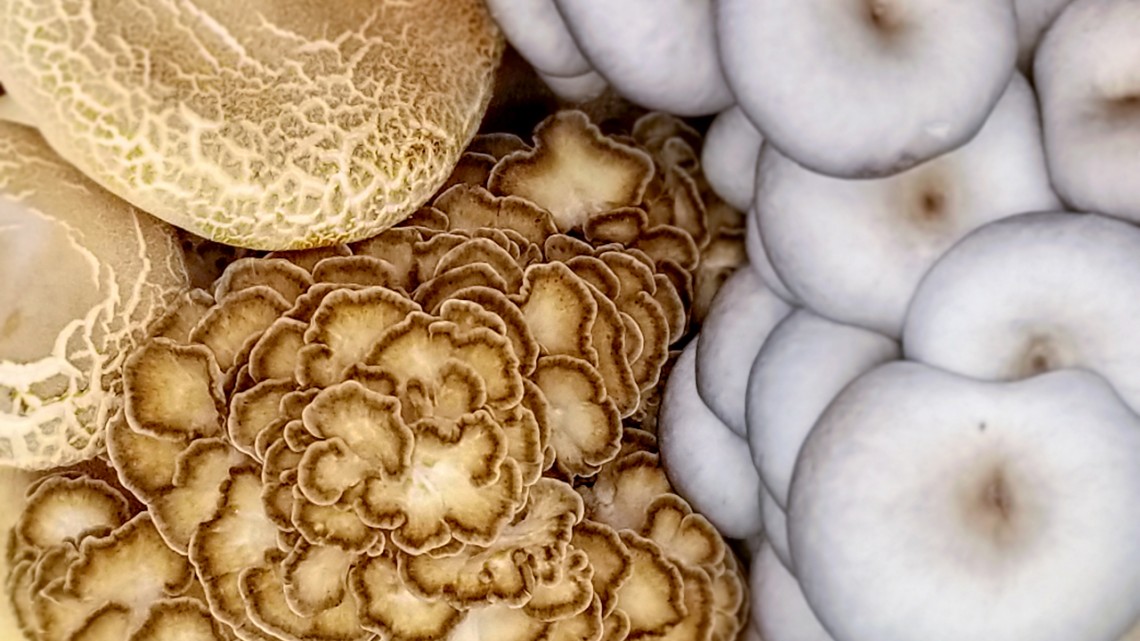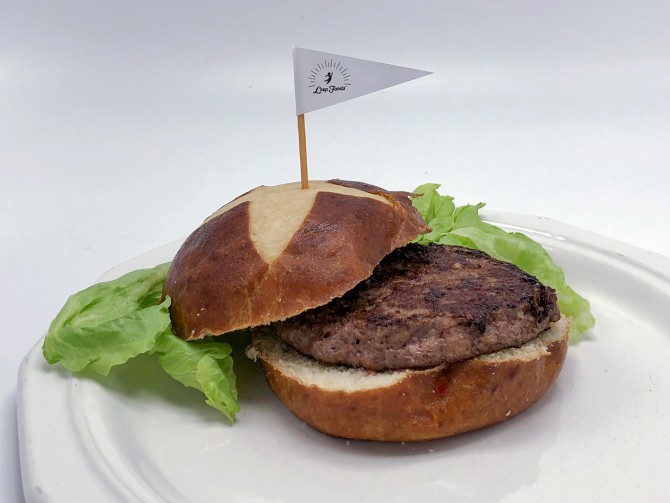
Button, Coral Maitake and Blue Oyster mushrooms, left to right, are pictured at the Leep Foods facility in Rochester, New York.
Startup works with Cornell AgriTech on mushroom burger
By Casey Verderosa
Mushrooms just might be the superhero of foods – they repurpose agricultural waste, are nutrient-dense, can help manage diabetes and can be used to decrease meat consumption.
It’s that last “superpower” that intrigues George Zheng, founder and chief operating officer of Rochester, New York-based Leep Foods. Zheng’s company grows and produces specialty mushrooms and – with help from the Center of Excellence for Food and Agriculture at Cornell AgriTech – Leep Foods is on a mission to positively impact the Western diet and the environment with the help of mushrooms.
In order to grow, mushrooms require clean biomass waste streams, found in abundance in upstate New York. And unlike your standard button mushrooms, Leep Foods’ trademarked Coral Maitake and Blue Oyster mushrooms are rich in fiber, micronutrients and antioxidants; have a low glycemic load; and contain all nine essential amino acids.
That last distinction makes the company’s fungi a hearty meat alternative. Leep Foods is currently preparing to launch its blended burgers – a patty that combines its specialty mushrooms with grass-fed beef. The burgers will serve as a meat supplement that helps reduce the overall consumption of animal products and makes for a burger that is lower in sodium, calories and saturated fat than a traditional burger.
And unlike all-beef patties, Leep Foods’ blended burgers will positively impact the environment. According to the World Resources Institute, “Americans eat approximately 10 billion burgers each year; replacing 30% of the beef in those burgers with mushrooms would reduce greenhouse gas emissions by 10.5 million tons of carbon dioxide equivalent per year, equivalent to taking 2.3 million cars off the road.”
“Leep Foods is a fantastic example of the kind of innovative, sustainably minded agricultural companies that we seek to foster,” said Catharine Young, director of the Center of Excellence. “The company’s growth highlights the robust food and agricultural ecosystem in New York state, and the abundance of resources that are available here for food and ag companies to grow and thrive.”
As Zheng and his colleagues started to gain traction, they looked to the Cornell Food Venture Center for assistance. The center helped them conduct product testing, gave them advice on food safety and provided suggestions for further product development.
The Food Venture Center also introduced the startup to the Center of Excellence.
“I wish we had been working with the Center of Excellence when we first started,” said Zheng. “It’s been so valuable having their resources, expertise and the connections that come with [the College of Agriculture and Life Sciences] – one of the most successful and well-regarded agriculture schools in the world. They helped us connect with the right people and resources on our path toward market traction with some of the largest food retailers in the U.S., and have fast-tracked our progress tremendously.”
Leep Foods is actively meeting with large retailers about its blended burger and anticipates full distribution of the specialty burger in 2020. The company’s target customers are what it terms “conscious carnivores” who are looking to reduce consumption of industrial meat and consume more nutrient-dense foods with a lighter environmental footprint without sacrificing taste.
In the meantime, the company is ramping up its organic mushroom capacity at its pilot facility. The increase in production will enable Leep Foods to exponentially increase distribution.
Said Zheng: “That’s always been our North Star – how to get more nutrient-dense foods to more people.”
Casey Verderosa is a writer for the Center for Regional Economic Advancement.
Media Contact
Get Cornell news delivered right to your inbox.
Subscribe


